人教版初中英语七年级下册Unit5SectionB教材全解
- 格式:doc
- 大小:81.00 KB
- 文档页数:6
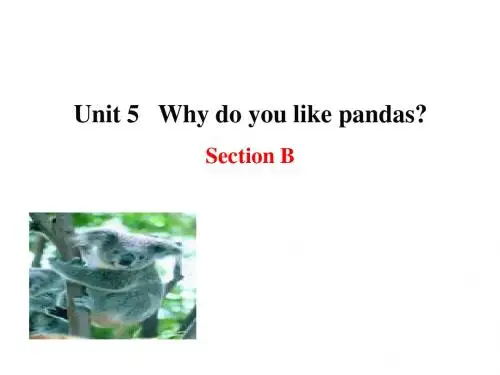
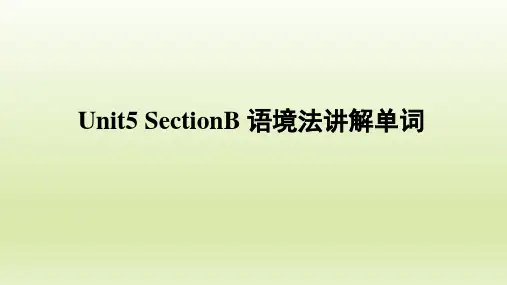
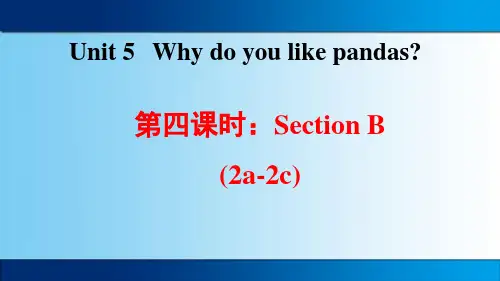
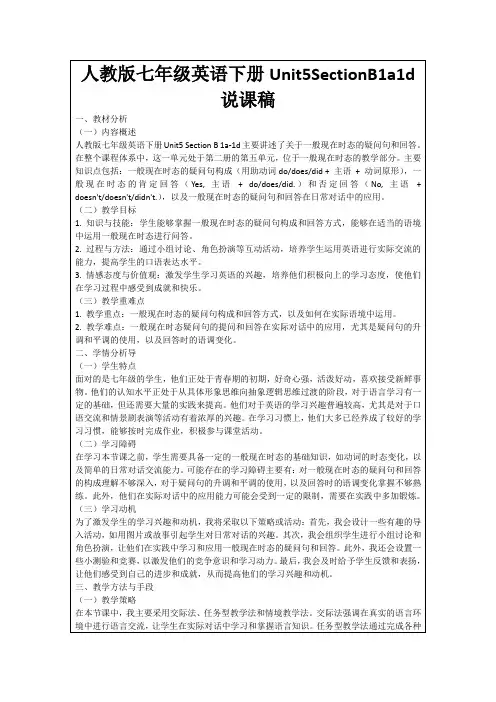
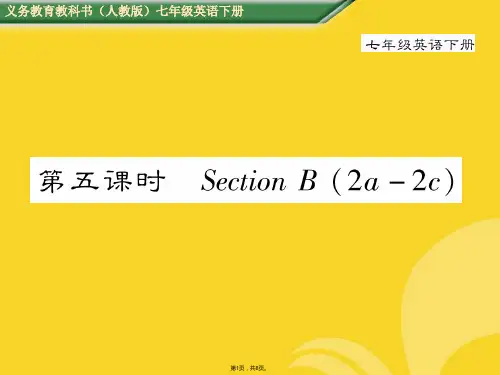
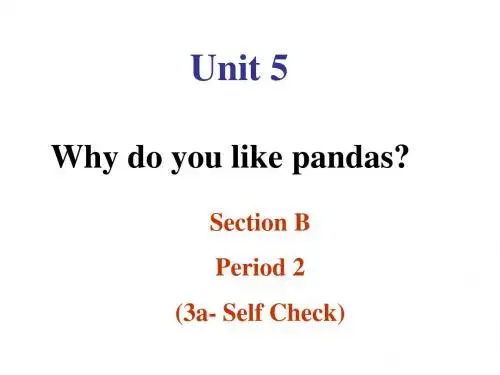
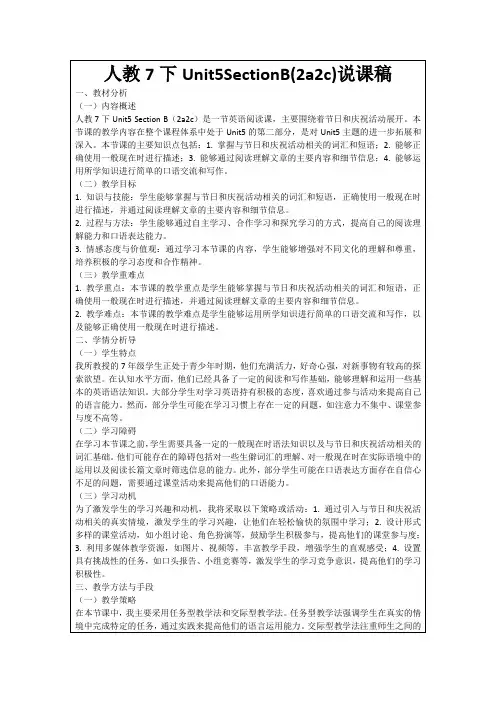
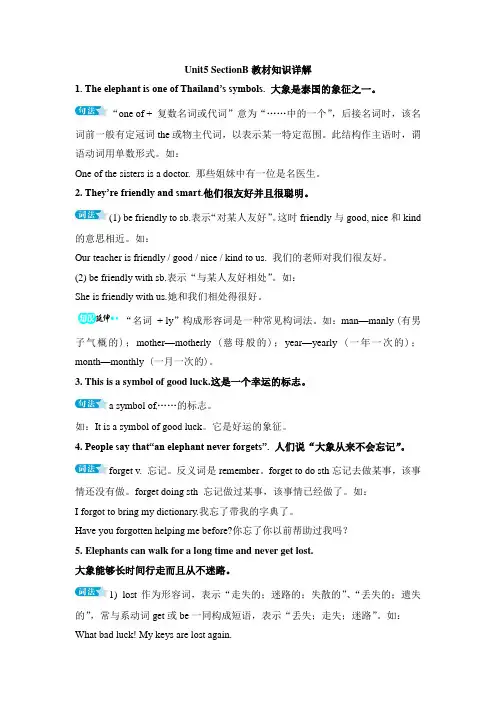
Unit5 SectionB教材知识详解1. The elephant is one of Thailand’s symbols. 大象是泰国的象征之一。
“one of + 复数名词或代词”意为“……中的一个”,后接名词时,该名词前一般有定冠词the或物主代词,以表示某一特定范围。
此结构作主语时,谓语动词用单数形式。
如:One of the sisters is a doctor. 那些姐妹中有一位是名医生。
2. They’re friendly and smart.他们很友好并且很聪明。
(1) be friendly to sb.表示“对某人友好”。
这时friendly与good, nice和kind 的意思相近。
如:Our teacher is friendly / good / nice / kind to us. 我们的老师对我们很友好。
(2) be friendly with sb.表示“与某人友好相处”。
如:She is friendly with us.她和我们相处得很好。
“名词+ ly”构成形容词是一种常见构词法。
如:man—manly (有男子气概的);mother—motherly (慈母般的);year—yearly (一年一次的);month—monthly (一月一次的)。
3. This is a symbol of good luck.这是一个幸运的标志。
a symbol of……的标志。
如:It is a symbol of good luck。
它是好运的象征。
4. People say that“an elephant never forgets”.人们说“大象从来不会忘记”。
forget v. 忘记。
反义词是remember。
forget to do sth忘记去做某事,该事情还没有做。
forget doing sth 忘记做过某事,该事情已经做了。
如:I forgot to bring my dictionary.我忘了带我的字典了。
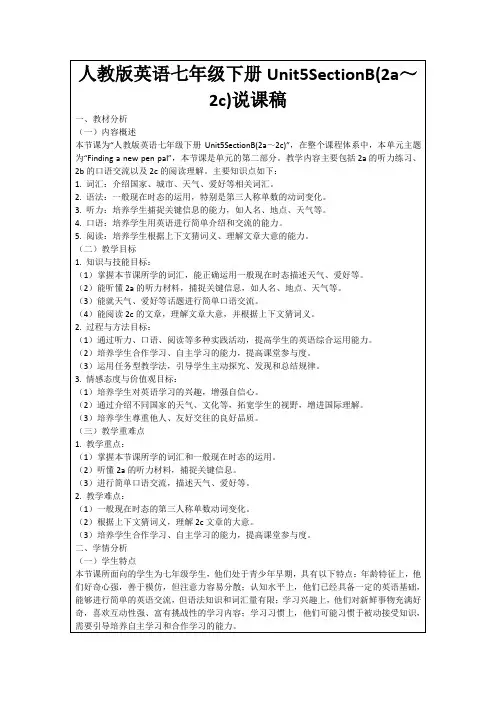
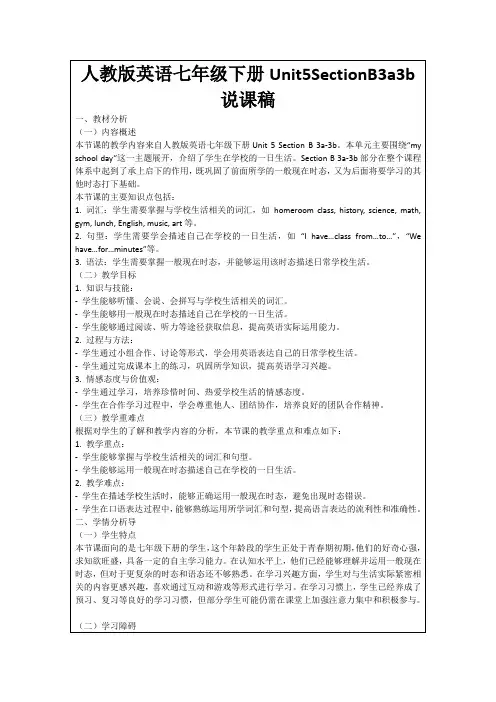
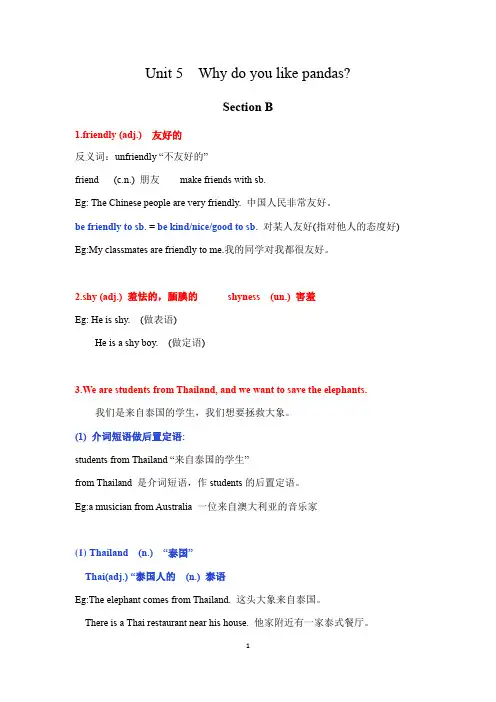
Unit 5 Why do you like pandas?Section B1.friendly (adj.) 友好的反义词:unfriendly “不友好的”friend (c.n.) 朋友make friends with sb.Eg: The Chinese people are very friendly. 中国人民非常友好。
be friendly to sb. = be kind/nice/good to sb. 对某人友好(指对他人的态度好) Eg:My classmates are friendly to me.我的同学对我都很友好。
2.shy (adj.) 羞怯的,腼腆的shyness (un.) 害羞Eg: He is shy. (做表语)He is a shy boy. (做定语)3.We are students from Thailand, and we want to save the elephants.我们是来自泰国的学生,我们想要拯救大象。
(1) 介词短语做后置定语:students from Thailand “来自泰国的学生”from Thailand 是介词短语,作students的后置定语。
Eg:a musician from Australia 一位来自澳大利亚的音乐家(1)Thailand (n.) “泰国”Thai(adj.) “泰国人的(n.) 泰语Eg:The elephant comes from Thailand. 这头大象来自泰国。
There is a Thai restaurant near his house. 他家附近有一家泰式餐厅。
He can speak Thai. 他会说泰语。
(2)save (v.) 救助save sb. 拯救某人save one’s life 拯救某人的生命Eg:The policeman saved the children from the water.那个警察把孩子们从水中救了出来。
人教版初中英语七年级下册Unit5SectionB教材全解人教版初中英语七年级下册Unit5SectionB教材全解Unit 5 Why do you like pandas?Unit 5 Section B教材全解1.friendly友好的【重点注释】friend形容词,是由名词friend+后缀ly组成的,意为“友好的”,其反义词是unfriendly“不友好的”。
例如:The people here are friendly.这儿的人很友好。
The old woman is very friendly.那位老妇人非常友好。
The person in the shop is unfriendly.商店里的那个人很不友好。
【拓展记忆】1)be friendly to sb.意思是“对某人友好”,指对别人的态度好、热情,相当于be kind to sb.。
例如:My classmates are all friendly to me .我的同学都对我很友好。
Lily is always friendly to others.莉莉对别人总是很友好。
2)be friendly with sb.意为“和某人关系好”或“与某人要好”。
例如:The classmates in our class are friendly with each other.我们班上的同学相互关系都很好。
3)make friends with sb.“和某人交朋友”。
例如:My brother makes friends with some foreighn students.我的哥哥和几个外国学生交朋友。
【图解辩异】friend(n.朋友)→friendly(adj.友好的)un-(否定前缀)+friendly →unfriendly(adj.不友好的)反义词【试题链接】——How are you getting along with your new classmate?——Very well.They are all me.A.afraid ofB.friendly toC.angry withD.sorry for(be afraid of“害怕”;be frien dly to“对……友好”;be angry with“生……的气”;be sorry for“为……感到抱歉”。
人教版初中英语七年级下册Unit5SectionB教材全解Unit 5 Why do you like pandas?Unit 5 Section B教材全解1.friendly友好的【重点注释】friend形容词,是由名词friend+后缀ly组成的,意为“友好的”,其反义词是unfriendly“不友好的”。
例如:The people here are friendly.这儿的人很友好。
The old woman is very friendly.那位老妇人非常友好。
The person in the shop is unfriendly.商店里的那个人很不友好。
【拓展记忆】1)be friendly to sb.意思是“对某人友好”,指对别人的态度好、热情,相当于be kind to sb.。
例如:My classmates are all friendly to me .我的同学都对我很友好。
Lily is always friendly to others.莉莉对别人总是很友好。
2)be friendly with sb.意为“和某人关系好”或“与某人要好”。
例如:The classmates in our class are friendly with each other.我们班上的同学相互关系都很好。
3)make friends with sb.“和某人交朋友”。
例如:My brother makes friends with some foreighn students.我的哥哥和几个外国学生交朋友。
【图解辩异】friend(n.朋友)→friendly(adj.友好的)un-(否定前缀)+friendly →unfriendly(adj.不友好的)反义词【试题链接】——How are you getting along with your new classmate?——Very well.They are all me.A.afraid ofB.friendly toC.angry withD.sorry for(be afraid of“害怕”;be friendly to“对……友好”;be angry with“生……的气”;be sorry for“为……感到抱歉”。
句意:你和你的新同学相处得怎么样?很好。
他们都对我很友好。
故选B。
)2.small小的【重点注释】small形容词,意为“小的“,常在句中作表语或定语。
例如:The koaka is very small.那只树袋熊非常小。
He lives in a small house.他住在一所小房子里。
【重点注释】①beautiful是表示“美丽”的最常用词语,不仅可以用来形容人或动物,也可以形容风景,服装或天气等。
它的语气很强,但一般不用来形容男性。
②pretty只用于修饰女孩,妇女或弱小的东西,语气较弱一些。
③good-looking 指“相貌好看的”。
语气较弱,可修饰男性和女性。
④handsome表示“英俊的,潇洒的”,主要用来形容男性。
4.shy【重点注释】①形容词,“害羞的,羞怯的”。
例如:Jenny is shy.詹尼很害羞。
②shyly副词,“害羞地”。
shyness名词,害羞。
5.We are students from Thailand,and we want to save the elephants.我们是来自泰国的学生,并且我们想要拯救大象。
【重点注释】①from介词,此处意为“来自……”,介词短语from Thailand意思是“来自泰国的”,作students的后置定语。
例如:He is a singer from Shandong.他是一名来自山东的歌手。
He has a letter from his father.他有一封来自他父亲的信。
There is a letter from her aunt.有一封她姑妈寄过来的信。
【归类记忆】介词短语常常用作后置定语,类似的情况如下:the bird in the tree 树上的那只小鸟。
the map on the wall墙上的地图。
The way to the hotel去旅馆的路。
The table near the window靠窗的桌子。
a film about the life of workers一部描写工人生活的电影。
【拓展记忆】介词from还有以下用法:1)表时间或地点,from…to…意为“从……到……”。
例如:We go to school from Monday to Friday.我们从星期一到星期五上学。
2)表距离,be far from意为“离……远”,be far away from“离……遥远”。
例如:Her house is far from our school.她的家离我们学校很远。
②save此处用作及物动词,意为“救,救助”,后接名词、代词作宾语。
save one’s life意为“挽救某人的生命”。
例如:He saved the boy’s life.他救了那个男孩生命。
Can you save him?你能救他吗?The doctor saved her life.医生救了她的命。
【拓展记忆】1)save还可意为“储蓄,储存”。
例如:save money存钱。
He saved a lot of money to buy a computer.他存了很多钱来买电脑。
2)save还可意为“节省,节约”。
例如:save water节约用水。
Please save water.请节约用水。
How do they save time?他们怎么节省时间?【试题链接】——I think you can money by yourself to buy a birthday present for your mother.——OK.I’ll try. I’ll not let a penny waste.A.spendB.saveC.costD.leave(spend“花费”;save“节约”;cost“价值”;leave“离开”。
句意:我以为你可以省着点儿钱给你妈妈买礼物。
好的,我尽量。
我不会浪费一分钱。
故选B。
)6.The elephant is one of Thailand’s symbols.大象是泰国的象征之一。
【重点注释】one of后接可数名词复数或代词宾格形式,意为“……之一,……中的一个”,作主语时谓语动词用单数。
例如:Kung Fu Panda is one of the most interesting films.《功夫熊猫》是最有趣的电影之一。
One of them is good at English.他们当中的一个擅长英语。
One of the students is not 14 years old.其中的一个学生还不到14岁。
【拓展记忆】代词one的用法很多,且容易误用,其常见的用法:1)one可以代替前面刚提到过的同一类人或物,只能代替可数名词,其复数形式是ones。
例如:I have a new story-book and several old ones.我有一个新故事书和几本旧故事书。
2)不定冠词a/an不可直接和one连用,但a/an后面有形容词时,可以和one 连用。
例如:Have you any books?I want to have an interesting one.你有书吗?我要一本有意思的。
7.Poeple say that “an elephant never forgets”.人们说“大象从来不会忘记”。
【重点注释】forget此处作不及物动词,意为“遗忘东西;忘记”;forget还可作及物动词,意思是“忘记”,后面可直接跟名词作宾语,也可接动词不定式或动名词(v.ing)。
forget的反义词为remember(记住),形容词为forgetful。
例如:He forgets her birthday.他把她的生日忘了。
I forgot her name.我把她的名字忘了。
Let’s forget the bad past!让我们忘记糟糕的过去吧!用leave。
例如:Sorry,I forget my key.抱歉,我忘带钥匙了。
I left my key in my office.我把钥匙落在办公室了。
[助记]forget真特殊,后有地状用leave。
8.Elephants can walk for a long time and never get lost.大象能够长时间行走而且从不迷路(大象能走很长一段时间并且不会迷路)。
【重点注释】for介词,后接时间段(段时间),表示动作或状态持续“一段时间”,。
for a long time意为“很长(一段)时间”。
例如:I can keep the book for two weeks.我可以借用这本书两周。
I did not see Merrick again for three years.我有三年没见到麦里克了。
【拓展记忆】介词for的用法:1)表示数量、距离、价格等,意为“达,计”。
例如:He walked for ten miles.他走了十英里路。
We have schoolbags for only 12 yuan.我们有仅售12元的书包。
I usually do the running for an hour in the morning.我早晨通常跑步一小时。
We will stay there for two days.我们将在那里逗留两天。
2)表示目的,意为“为了”。
What did you do that for?你那样做是为了什么?(此处what…for相当于why)3)表示对象、用途等,意为“为;对于;供;适合于”。
例如:Here is a letter for you.这是你的信。
Do you have any books for children?你有适合儿童看的书吗?4)表示理由或原因,意为“因为,由于”。
例如:Thank you for your last letter.谢谢你上次的来信。
Thank you for helping me with my English.谢谢你帮我学习英语。
5)表示“支持,赞成”。
例如:Are you for this plan or against it?你是支持还是反对这个计划?6)用于一些固定搭配中。
例如:Who are you waiting for?你在等谁?②lost此处用作形容词,意为“迷路的,丢失的”,常与系动词get或be构成短语,即get/be lost,意为“迷路;丢失”。